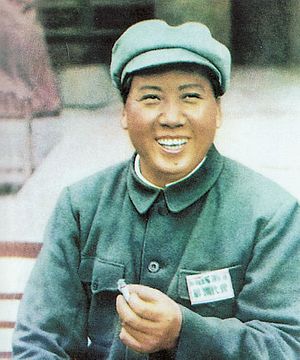Picture a leader in charge of a political party whose other senior leaders hold him almost in as much contempt as he holds them. One who exults in contradictory statements and constant changes of posture and mind. Someone who has had multiple marriages, and a complex private life. A person who appeals to people’s fears, and whose prime approach often seems to stir up widespread upheaval and unrest.
That description is of Mao Zedong, but applies equally well to U.S. President-elect Donald Trump.
Mao’s style of leadership is said to be emulated by his current successor, Xi Jinping. But it is hard to imagine Mao making the kind of speech about the merits of globalization that China’s current leader just delivered at the elite economic summit in Davos. Actually, it is hard to imagine Mao making any speech anywhere outside of China, period.
Paradoxically, the real heir to the spirit of Maoist politics sits these days not in Beijing, but several time zones away, in Washington. Trump’s tendency to speak directly to the public through Twitter and his own personal voice has eerie parallels with the way that Mao often subverted his own propagandists and state media, reaching above their heads to the people, whom Mao always claimed to stand with.
Then there is the exultation in contradictions for the sake of being contradictory. Mao, it is claimed, was influenced by the gnomic utterances of Daoism, with their waves of opposing statements mapping out a level of truth beyond the truth mostly known and striven for by humans. Trump simply seems immune to the empirical world that most people take as their starting place for understanding and enlightenment. For him, as for Mao, truth is negotiable, and more often than not something subservient to the political mood of the moment. Mao’s greatest, perhaps his only contribution to theoretical Marxism, was the 1930s essay, “On Contradictions.” “Contradictions,” he stated there, “are the essence of life.” It is hard to see Trump disagreeing.
Negotiating a new reality extends down even to approaches to the environment and natural world. Long before climate change became a worry, Mao Zedong showed a dismissive attitude toward the environment. According to Judith Shapiro’s study from over a decade ago, Mao was a firm anthropomorphist, looking at the world as a place to be struggled against, reshaped and adapted to humanity and their primacy. We don’t know if Trump has the same macho views, but he certainly places humans at the center of everything, and seems almost recklessly heedless of the impact of industrial and other human action on the natural world.
Then there is the delicate matter of attitudes toward the political system itself. Mao remained a revolutionary to his dying days. He regarded the “swamp” of bureaucracy and governance in Beijing as manifestations of the Communist Party becoming its own vested interest and simply working for itself. The Cultural Revolution began in 1966 was, among many other things, a vicious attack on the Party by one of its founding leaders and by far its most influential one. Mao would have regarded Trump’s contemporary version of an American-style Cultural Revolution as simply a poor shadow of how it should be done properly. But Mao would have had no trouble understanding the political purpose and the reasons behind what Trump has called “The Movement.” Trump’s attitude, to the PRC’s founder, would merely be sound Maoism.
Then finally there is the lifelong aversion that Mao had to intellectuals. From his days as a humble librarian at Peking University in the 1910s, Mao disliked scholars, and reserved particularly brutal treatment for those that even slightly opposed him. He would have given a mark of approval to the furious anger that Trump directs at those he regards as snooty elites in their ivory towers trying to question him.
Mao’s style of politics is talked of as being back in favor in China. But in truth, that is more a question of the surface style of Xi’s politics, rather than its substance. The current Chinese leadership would not want to wage the wars of class struggle, or set up the brutally antagonistic relationships with the outside world sponsored by the Chairman when he was alive. And they would rather relocate to the outer fringes of the solar system than follow his wholly discredited economics. Mao’s genius in messaging, in marrying traditional ways of thinking for Chinese with modernizing preoccupations, however, is something modern-day leaders clearly are attracted by. They like and try to emulate Mao the messenger, even while repudiating much of his message.
For Trump though, it seems that class struggle, fights between different parts of the bureaucracy, and a wholesale onslaught on the very culture of governance and administration in the United States is very much in the cards. Brutal attacks on the media, constant direct appeals to the public to support him in taking on the vested interests of the elite, and a policymaking ethos dominated by contradictions seems to be what America and the world can expect in the coming years. Chinese people, who had experience of this form of politics within living memory, can only stand by and nod with bewildered pity. They know where this story ends up.
The American people are about to find out.

































